
- Subject:
- Psychology
- Social Science
- Material Type:
- Unit of Study
- Provider:
- Rice University
- Provider Set:
- OpenStax College


By the end of this section, you will be able to:Discuss how research involving human subjects is regulatedSummarize the processes of informed consent and debriefingExplain how research involving animal subjects is regulated

This chapter covers:Why is Research Important?Approaches to ResearchAnalyzing FindingsEthicsFor more information, visit OpenStax College.
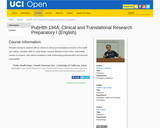
Provides training for students with an interest in clinical and translational research in the health care setting. Cultivates skills for study design, research literature review, ethics, responsible conduct of research, and cultural competence while emphasizing professionalism and personal responsibility.

Introducing public health ethics poses two special challenges. First, it is a relatively new field that combines public health and practical ethics. Its unfamiliarity requires considerable explanation, yet its scope and emergent qualities make delineation difficult. Moreover, while the early development of public health ethics occurred in a western context, its reach, like public health itself, has become global. A second challenge, then, is to articulate an approach specific enough to provide clear guidance yet sufficiently flexible and encompassing to adapt to global contexts. Broadly speaking, public health ethics helps guide practical decisions affecting population or community health based on scientific evidence and in accordance with accepted values and standards of right and wrong. In these ways, public health ethics builds on its parent disciplines of public health and ethics. This dual inheritance plays out in the definition the U.S. Centers for Disease Control and Prevention (CDC) offers of public health ethics: “A systematic process to clarify, prioritize, and justify possible courses of public health action based on ethical principles, values and beliefs of stakeholders, and scientific and other information” (CDC 2011). Public health ethics shares with other fields of practical and professional ethics both the general theories of ethics and a common store of ethical principles, values, and beliefs. It differs from these other fields largely in the nature of challenges that public health officials typically encounter and in the ethical frameworks it employs to address these challenges. Frameworks provide methodical approaches or procedures that tailor general ethical theories, principles, values, and beliefs to the specific ethical challenges that arise in a particular field. Although no framework is definitive, many are useful, and some are especially effective in particular contexts. This chapter will conclude by setting forth a straightforward, stepwise ethics framework that provides a tool for analyzing the cases in this volume and, more importantly, one that public health practitioners have found useful in a range of contexts. For a public health practitioner, knowing how to employ an ethics framework to address a range of ethical challenges in public health—a know-how that depends on practice—is the ultimate take-home message.

To provide instruction and dialog on practical ethical issues relating to the responsible conduct of human and animal research in the brain and cognitive sciences. Specific emphasis will be placed on topics relevant to young researchers including data handling, animal and human subjects, misconduct, mentoring, intellectual property, and publication.
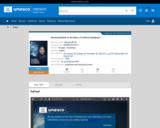
This Recommendation addresses ethical issues related to the domain of Artificial Intelligence to the extent that they are within UNESCO’s mandate. It approaches AI ethics as a systematic normative reflection, based on a holistic, comprehensive, multicultural and evolving framework of interdependent values, principles and actions that can guide societies in dealing responsibly with the known and unknown impacts of AI technologies on human beings, societies and the environment and ecosystems, and offers them a basis to accept or reject AI technologies. It considers ethics as a dynamic basis for the normative evaluation and guidance of AI technologies, referring to human dignity, well-being and the prevention of harm as a compass and as rooted in the ethics of science and technology.

This textbook is an adaptation of the Research Methods in Psychology that is available on this site in US and Canadian editions. This New Zealand edition is an adaptation to the New Zealand context. The main changes are in Chapters 1 and 3 and the spelling, grammar, and terminology are changed throughout. This textbook is adopted at the University of Waikato in our 200-level research methods in psychology class.
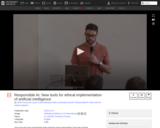
Scott Young and Jason Clark (Montana State University) present 'Responsible AI: New tools for ethical implementation of artificial intelligence' during the AI & Professional Development session at the Fantastic Futures ai4LAM 2023 annual conference. This item belongs to: movies/fantastic-futures-annual-international-conference-2023-ai-for-libraries-archives-and-museums-02.
This item has files of the following types: Archive BitTorrent, Item Tile, MP3, MPEG4, Metadata, PNG, Thumbnail, h.264 720P, h.264 IA
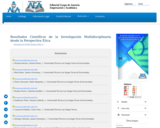
El presente manuscrito es resultado de investigaciones multidisciplinarias bajo diferentes perspectivas científicas-académicas, mediante la confrontación de criterios de diferentes autores bajo un enfoque descriptivo que señala la importancia de ética en varios escenarios actuales como son la discriminación del trabajo dentro del caso de estudio en Santo Domingo, se resalta la importancia de los principios éticos en los negocios globales, se analiza la perspectiva ética de la publicad en empresas ecuatorianas bajo un enfoque de responsabilidad social, se aborda temáticas como la ética laboral desde la perspectiva de un mercado cambiante, al igual que la ética en organizaciones sociales y por último se abordan el tema el impacto del comportamiento de los individuos dentro de las organizaciones empresariales. Estos estudios se realizan desde una mirada científica y se la acerca a la realidad ecuatoriana.
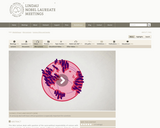
This Mini Lecture deals with question of the socio-political responsibility of science with lecture snippets of Nobel Laureates Roald Hoffmann, Dickinson Richards, Werner Forssmann, and Christian de Duve.

This course focuses on early-stage biotechnology companies with particular emphasis on understanding the underlying science, technology, and disease targets—together with the application of novel business structures and financing methods—to facilitate drug discovery, clinical development, and greater patient access to new therapies.
The course was created for MITx as a collaboration between the Whitehead Institute and the Sloan School of Management and is now archived on the Open Learning Library (OLL), which is free to use. You have the option to sign up and enroll in each module if you want to track your progress, or you can view and use all the materials without enrolling.

This course examines interpersonal and group dynamics, considers how the thoughts, feelings, and actions of individuals are influenced by (and influence) the beliefs, values, and practices of large and small groups. Learning occurs through a combination of lectures, demonstrations and in-class activities complemented by participation in small study groups and completion of homework assignments.

In this course, social, ethical and clinical issues associated with the development of new biotechnologies and their integration into clinical practice is discussed. Basic scientists, clinicians, bioethicists, and social scientists present on the following four general topics: changing political economy of biotech research; problems associated with the adaption of new biotechnologies and findings from molecular biology for clinical settings; the ethical issues that emerge from clinical research and clinical use of new technologies; and the broader social ethics of access and inequality.

This thought experiment, based on an essay by Professor Thomas Nagel, Philosopher at New York University, encourages students to question the morality of intervention. Professor Nagel attempted to liberate a spider he found living in a urinal from it is seemingly terrible living situation, only to find it dead the next day. Wracked with guilt, he began to question his decision. Should he have moved the spider? What would you have done?
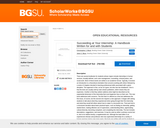
There are several textbooks for students whose majors include internships in human services, broadly defined, such as case management, counseling, criminal justice, and social work. Most of these books are written in an academic format. Typically, it involves an introduction to a theoretical orientation that concerns working with others followed by a series of chapters devoted to learning professional skills associated with a given discipline. This approach is fine, as far as it goes, but also has two drawbacks. One is that the texts are usually sold by main stream publishers, which means they are expensive. Another is that they seldom address what might be described as the experiential dimension of the internship that most beginners face on their own. This new book addresses both concerns. The fact that it is offered as a free text addresses the first issue, of course, but the second one requires a new approach. It began with asking students to talk about what they experienced when going through their first internship and what they would tell others about how to make it a successful one. That work led to a structured narrative about basic practical topics, such as finding an internship, getting started there, making effective use of supervision, understanding ethics, appreciating cultural diversity, becoming competent, and completing the internship. The text includes descriptions, suggestions, and exercises. It may be used as either a primary course text or, due to its relative brevity, a supplemental one. Although the lead editor is an experienced clinician and professor who has supervised internships for a variety of human services majors over many years, the book was written with and for students to make it more readable and more useful.

A website of materials intended to replace textbooks and/or are required readings in the following courses at the College of DuPage: SURGT1000: Ethical Considerations in the Healthcare Industry, and SURGT1001: Surgical Asepsis and Sterile Technique.
Many of these resources are freely available online, though an institutional login may required to access some materials. All materials are licensed as indicated in the source material.
This resource will be updated as needed. For the most recent version, visit: https://sites.google.com/view/surgt/home .
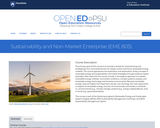
The primary goal of this course is to provide a toolset for characterizing and strategizing how nonmarket forces can shape current and future renewable energy markets. The course approaches the exploration and explanation of key concepts in renewable energy and sustainability nonmarket strategies through evidence-based examples. Main topics for the course include: a sociological approach to markets, renewable energy markets, nonmarket conditions, complex systems analysis, and renewable energy technology and business environments. Because renewable energy costs are higher than fossil fuel cost per unit of energy, the main arguments in support of renewable energy, thus far, are functionally nonmarket in character, i.e., environmental (e.g., climate change), political (e.g., energy independence), and/ or social (e.g., good stewardship).
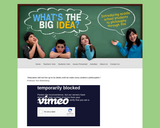
This website is a tribute to the intellectual curiosity of young people. We know that they have
questions about all the big ideas that have engaged philosophers throughout the ages. What they
don’t have is a way to discuss those questions with other people, especially in an educational
setting.
That’s where you come in! By using this website, you’ll provide your wonderfully intelligent
and boldly inquisitive students with the opportunity to engage in a range of philosophical
discussions about issues that other students their age have told us were the most pressing ones in
their lives.
You may be wondering how you can do this without having any philosophical training. You will
be relieved to discover that teaching philosophy to secondary school children does not involve
giving lectures on the great philosophers of the past or the central problems of Western
philosophy. What is does require is that you commit yourself to giving your students the
opportunity to discuss philosophical questions among themselves.
We have tried to make this as easy for you as possible. We have created webpages devoted to
different philosophical issues that students have told us they want to discuss with their peers. On
each page, you will find a variety of different film clips. At the end of each clip, questions for
discussion appear on the screen. If you just pause the clip, you or a student can read the question
out loud to begin a philosophical discussion.
Your role is to facilitate that discussion, not tell the students what to think about anything; your
role is to assist students so that they can have a productive discussion with one another. For even
though children may be natural-born philosophers, they are not born ready to discuss issues with
their peers. That’s what we hope to help them with on this site.
Because “all” that the teacher has to do is to assist the children in their philosophical discussion,
it doesn’t require any special philosophical knowledge to teach philosophy to secondary school
children. All you need to know is how to facilitate a discussion among your students and, of
course, how to navigate this website so you know how to get to the material you need when you
need it!

This subject examines relationships among technology, culture, and politics in a range of social and historical settings. The class is organized around two topics: Identity and infrastructure, and will combine interactive lectures, film screenings, readings, and discussion.